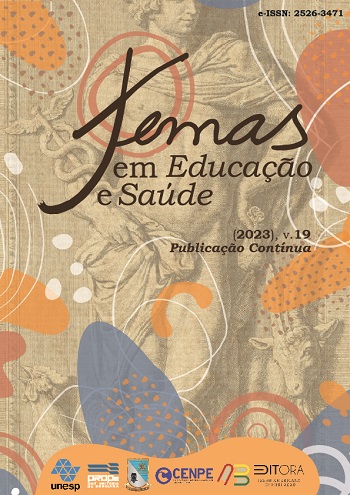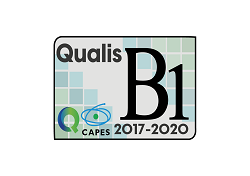Respondiendo a las necesidades de salud mental de los niños en un servicio público de salud en Brasil
El uso de la danza en una intervención psicosocial grupal piloto
DOI:
https://doi.org/10.26673/tes.v19i00.17654Palabras clave:
Infancia, Salud pública, Juegaterapia, Danza, Determinantes sociales de la saludResumen
La pandemia del COVID-19 ha intensificado aún más la ya considerable demanda de tratamiento psicológico para niños. Sin embargo, en Brasil y en varios otros países, faltan recursos y tratamientos dirigidos a la salud mental infantil basados en evidencias empíricas. Ante este escenario, se realizó una evaluación de la eficacia de un abordaje psicosocial grupal piloto denominado "Grupo Operativo Lúdico" (GOL) en un servicio público de salud. Este modelo pretende no sólo promover la salud mental, sino también contribuir a aumentar la equidad mediante el reconocimiento de los determinantes sociales de la salud. Para medir los problemas de conducta, se utilizó un análisis basado en el principio de intención de tratar. Sin embargo, este análisis no mostró la eficacia de la intervención, sino que, mediante un análisis exhaustivo de los casos, se comprobó que el programa tenía un impacto positivo en los problemas de interiorización observados en los niños. El modelo GOL tiene una particularidad llamativa, ya que destaca por ser uno de los pocos métodos que incorpora la danza en su enfoque. La danza tiene el potencial de fomentar la expresión de sentimientos y ampliar la percepción corporal. Los resultados de este estudio sugieren la viabilidad y pertinencia de utilizar el movimiento corporal y la danza como componentes eficaces en las intervenciones psicosociales.
Descargas
Citas
ACHENBACH, T. M.; RESCORLA, L. A. Manual for the ASEBA school-age forms & profiles: an integrated system of multi-informant assessment. Burlington, Vermont: ASEBA, 2001.
ARMSTRONG, R. A. When to use the Bonferroni correction. Ophthalmic Physiol Opt, v. 34, n. 5, p. 502–508, 2014. Disponível em: https://onlinelibrary.wiley.com/doi/10.1111/opo.12131. Acesso em: 24 mai. 2023
CIAMPA, A. C. A história de Severino e a história de Severina - Um ensaio de psicologia social. São Paulo: Brasiliense, 1987.
D’OTTAVIANO, I. M. L.; BRESCIANI, E. F. Basic concepts of systemics. In: PEREIRA JR, A.; PICKERING, W. A.; GUDWIN, R. R. (ed.). Systems, self-organization, and information: an interdisciplinary perspective. London: Routledge, 2019. p. 47–63.
DEL PRETTE, Z. A. P.; DEL PRETTE, A. Psicologia das habilidades sociais na infância: teoria e prática. Petrópolis, RJ: Vozes, 2013.
ENDERS, C. K. Multiple imputation as a flexible tool for missing data handling in clinical research. Behav Res Ther, v. 98, p. 4–18, 2017. Disponível em: https://linkinghub.elsevier.com/retrieve/pii/S0005796716301954. Acesso em: 24 maio 2023.
FREIRE, P. Pedagogia do oprimido. São Paulo: Paz e Terra, 2005.
GUIMARÃES, C. A.; COSTA, C. S. L.; LESSA, T. C. R. Avaliação e manejo de habilidades sociais e problemas de comportamento em crianças pré-escolares com deficiência. Temas em Educ. e Saúde, Araraquara, SP, v. 18, n. 00, jan./dez. 2022. e-ISSN: 2526-3471. Disponível em: https://periodicos.fclar.unesp.br/tes/article/view/15877. Acesso em: 24 maio 2023.
INSTITUTO AYRTON SENNA. Mapeamento socioemocional. São Paulo: Instituto Ayrton Senna, Secretaria de Educação do Estado de São Paulo, 2022. Disponível em: https://institutoayrtonsenna.org.br/app/uploads/2022/12/IAS_SaudeMental_2022-1.pdf. Acesso em: 15 maio 2022.
KENWARD, M. G.; CARPENTER, J. Multiple imputation: current perspectives.
Stat Methods Med Res, v. 6, n. 3, p. 199–218, 2007. Disponível em: https://www.researchgate.net/publication/6217387_Multiple_Imputation_Current_Perspectives. Acesso em: 24 maio 2023.
LABAN, R. Dança educacional moderna. São Paulo: Ícone, 1990.
LANGER, R. J. Grupos clínicos con niños: teoría y técnica. Buenos Aires: Trieb, 1983.
LI, P.; STUART, E. A.; ALLISON, D. B. Multiple imputation: a flexible tool for handling missing data. Jama, v. 314, n. 18, p. 1966–1967, 2015. Disponível em: https://jamanetwork.com/journals/jama/article-abstract/2468879. Acesso em: 24 maio 2023.
MEIRELLES-SANTOS, M. B. Singularidades do Projeto de Vida: trincheiras de jovens que estiveram nas ruas. 1995. Dissertação (Mestrado em Psicologia Social) – Pontifícia Universidade Católica de São Paulo, São Paulo, 1995.
MUTHÉN, L. K.; MUTHÉN, B. O. Mplus user’s guide. 8. ed. Los Angeles: Muthén & Muthén, 2017.
PAULA, C.S. et al. How to improve the mental health care of children and adolescents in Brazil: actions needed in the public sector. Brazilian Journal of Psychiatry, v. 34, n. 3, p. 334-351, 2012.
PEREIRA, A. L. et al. O SUS no seu município: garantindo saúde para todos. Brasília, DF: Ministério da Saúde, 2004.
PICHON-RIVIÈRE, E. O processo grupal. São Paulo: Martins Fontes, 2000.
POLANCZYK, G. V. et al. Annual research review: a meta-analysis of the worldwide prevalence of mental disorders in children and adolescents. Journal of Child Psychology and Psychiatry, v. 56, n. 3, p. 345−365, 2015. Disponível em: https://acamh.onlinelibrary.wiley.com/doi/10.1111/jcpp.12381. Acesso em: 24 maio 2023.
RUBIN, D. B. Multiple imputation for nonresponse in surveys. Hoboken: Wiley, 2004.
SIU, A. F. Effectiveness of Group Theraplay® on enhancing social skills among children with developmental disabilities. International Journal of Play Therapy, v. 23, n. 4, 2014. Disponível em: https://psycnet.apa.org/doiLanding?doi=10.1037%2Fa0038158. Acesso em: 24 maio 2023.
SWEENEY, D. S.; BAGGERLY, J.; RAY, D. C. Group play therapy: a dynamic approach. New York: Routledge, 2014.
WEBB, N. B. Play and expressive therapies to help bereaved children: Individual, family, and group treatment. Smith College Studies in Social Work, v. 73, n. 3, p. 405–422, 2003. Disponível em: https://www.tandfonline.com/doi/abs/10.1080/00377310309517694. Acesso em: 24 maio 2023.
Descargas
Publicado
Cómo citar
Número
Sección
Licencia
Os manuscritos aceitos e publicados são de propriedade da Temas em Educação e Saúde. Os artigos publicados e as referências citadas na Temas em Educação e Saúde são de inteira responsabilidade de seus autores. É vedada a tradução para outro idioma sem a autorização escrita do Editor ouvida a Comissão Editorial.







